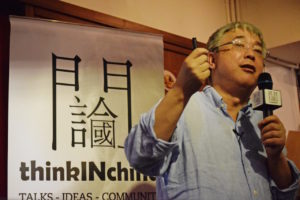

SPEAKER
CUI Zhiyuan 崔之元, Professor, School of Public Policy and Management, Tsinghua University
At the start of a new season, ThinkIN China (TIC) is delighted to have hosted over 150 young scholars for the new season´s opening event on September 22nd at Wudaokou´s Bridge Café.
TIC was honoured to present Professor Cui Zhiyuan as the evening´s speaker who explored the origin, evolution, implications and impact of the concept of the Beijing Consensus.
Professor Cui is known as one of the fathers of China´s so-called New Left and the concept of the Beijing Consensus itself.
Cui began his talk by describing the evolution of the concept of Beijing Consensus: The term was first established by Joshua Ramo in cooperation with Cui Zhiyuan himself as a result of Ramo’s social inquiry among 100 Chinese policy makers and intellectuals. Although the explicit term never fell during these interviews, Ramo thinks the idea of a “Beijing Consensus” clearly summarized their outcome.
Cui proceeded by describing how the Beijing consensus as a concept has evolved into the so-called “Chinese Way”, becoming a more official slogan as well as a political term recognized even by President Xi Jinping.
He himself would never have expected this idea of Ramo’s to become an official political term, Cui added.
The Beijing Consensus vs. the Washington Consensus
Ramo contrasted the Beijing Consensus with the Washington Consensus. He considered some elements of Washington consensus to be good, but inapplicable to the Chinese context.
Whereas the Washington consensus lays focus on privatization, the Beijing consensus emphasizes experimentation.
The Beijing Consensus is a more philosophical, pragmatic view that led Deng Xiaoping´s reforms in 1978 and has its roots in modern China, its three main points being:
The theory behind the Beijing Consensus and its historic roots
In order to shed light on the Chinese dimension of the Beijing Consensus, Cui went back and explored its historic origins. Pragmatism – the theory behind the Beijing Consensus – refers to an American political philosophy first introduced by Peirce and Dewey in the late 19th century. This theory emphasizes the consequences of social and political interaction. According to this theory, policy can´t ignore the reality of social conditions, but has to make it the basis of all political decisions.
The influence of pragmatism in Chinese politics traces back as far as 1919 when Dewey first visited China and came in contact with almost all key political and intellectual figures in China at the time, amongst them Sun Yat-Sen and young Mao Zedong. Cui went on to illustrate the pragmatic elements in Mao Zedong thought and policy, such as the “From point to surface” 由点到面 (youdiandaomian) working method.
Chinese pragmatism embraces the main idea of the original theory of pragmatism: the emphasize on experimentation and adjustment to the social conditions. Since Deng Xiaoping´s reforms, Chinese pragmatism has exclusively revolved around experimentation, leaving aside the requirement of democracy, the core of the original theory.
The practical implementation of the pragmatic approach
In practice, experimentalism in today´s China is more successful in policy areas related to economic growth than in policy areas related to social innovation and social protection.
But, as Cui went on, even where experimentalism is successful, its evaluation and its “peer review” is under-developed, resulting in a lack of “reflexively monitoring of its own effectiveness” (Jack Knight and James Johnson, “The Priority of Democracy”, p.216).
As a conclusion, Professor Cui described the pragmatic approach of the Beijing Consensus as flexible and partly successful, but still truncated and facing lots of problems and failures.
The Chinese pragmatic approach gave rise to a vibrant discussion during the Q&A-session: Where can this pragmatism be found in major international economic initiatives such as the Belt and Road Initiative? Can pragmatism resolve the issue of lacking incentive for political reform? And – what Cui called the key question: How can pragmatism be sustained without a democratic political basis? There is no denial of the persistence of censorship and self-censorship in China, as Cui put it, but he emphasized that democracy had indeed made progress in China.
What to expect from Xi´s second term?
The topic of Xi Jinping´s second mandate was touched upon during the Q&A-session, as Professor Cui was asked about his expectations for Xi´s second term with respect to what had been decided on the third plenum of the 18th party congress: the plan of giving the market force a decisive role in resources allocation and the decision for comprehensive reform of governance system and capacity.
Cui considered the change of a single word to be significant: The 16th and 17th party congress had already decided to give market force a fundamental role in resources allocation. This change from “fundamental” to “decisive” suggests a stronger emphasize on the role of market force in the process of resource allocation.
Moreover, Cui considered the distinction of governance system and governance capacity to be particularly striking, as it implies that there can be different levels of capacity under the same governance system. In Cui´s view, this may open a whole range of possibilities for reform in marginal areas in order to increase governance capacity which in turn might even lead to marginal reform in the political sphere.
Find here the ppt used by professor Cui during his presentation.
Report written by Theresa Stubhan